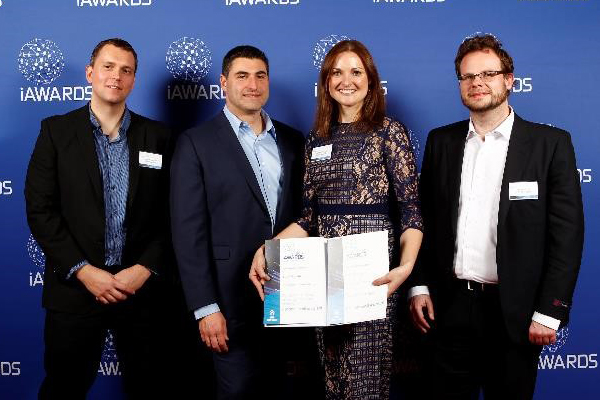01 June 2018

Dr Michelle Perugini
Co-Founder and Managing Director, Life Whisperer
Co-Founder, Presagen
Bachelor of Medical and Pharmaceutical Biotechnology (Honours) (University of South Australia)
PhD in Medicine (University of Adelaide)
A passion for turning scientific ideas into beneficial businesses prompted Dr Michelle Perugini to take the leap from medical researcher to artificial intelligence (AI) entrepreneur. Her latest venture combines both fields to improve the success rates of couples undergoing IVF.
After finishing her Bachelor of Medical and Pharmaceutical Biotechnology with First Class Honours in cancer research at UniSA, Dr Perugini fell in love with scientific research. Upon completing her PhD in Medicine, she went on to work at SA Pathology and the Centre for Cancer Biology, focusing specifically on Acute Myeloid Leukaemia and other blood disorders.
During her eleven successful years working in health and medical research, Dr Perugini developed a passion for entrepreneurship and loved the idea of building a product that could link the gap between research and the commercial sector.
“My husband worked as a research scientist for the Department of Defence, developing AI technology, and we were both experiencing a desire to translate our understanding of our disciplines into something useful to the real world. So in 2008 we decided to start our first commercial venture together,” Dr Perugini says.
“There was a whole range of commercial problems we could apply AI technology to, so we founded ISD Analytics and built a globally scalable product that worked to predict human behaviour in a range of industries such as health, education, energy and other government policy areas.
“We sold the product all around the world, and really enjoyed the experience and value that came from creating something scalable that could make a difference.”
After selling ISD Analytics to Ernst & Young in 2015, Dr Perugini and her husband Dr Don Perugini developed their second start-up company, Presagen. Working this time to develop an advanced AI platform for 1) human behaviour automation that uses unique defence technology, psychology and behavioural science to automate complex human-centric tasks, and 2) image-based medical diagnostics that analyses historical medical images to create accurate diagnostic tools.
A self-taught AI technologist, Dr Perugini realised the potential of the technology in improving fertility rates while she was mentoring PhD candidate, Jonathan Hall.
“Jonathan came up with the concept around applying AI and computer vision technology to better select healthy embryos for implantation in IVF, and given my scientific background in stem cells and genetics, I was absolutely taken with the idea.
“I had trouble conceiving both of my children – I was actually booked in for IVF for my first child when I managed to fall pregnant with the help of hormonal treatment, so I experienced some of the torment of wanting to have children but not being able to,” she says.
At the start of 2017, Dr Perugini, her husband, and Dr Jonathan Hall co-founded Life Whisperer, an image analysis tool built upon Presagen’s AI platform that identifies the morphological features of healthy embryos often invisible to the human eye.
According to IVF Australia, the success rate of fresh embryo transfers resulting in live births in 2015 ranged from 8.8% to 37% depending on a patient’s age. Dr Perugini says the predictive power of Life Whisperer can significantly increase the chances of a successful pregnancy and improve current low success rates.
“A clinician makes a decision on which embryo to transfer to a patient based on a manual visual assessment through a microscope. This is a difficult choice as there are not many visible defining features that highlight which embryo is the best option.
“With Life Whisperer, the clinician can simply drag and drop images of the patients’ embryos onto the web-based tool which will apply our algorithm to assess and rank each embryo on the likelihood of success. It’s great because it’s non-invasive and provides the clinician with additional information and assurance.”
In June 2017, Dr Perugini partnered with Monash IVF, one of Australia’s largest IVF service providers, to leverage thousands of stored embryo images to conduct a retrospective study. Life Whisperer demonstrated its AI outperformed embryologists in identifying the most viable embryos among the medical images of almost 600 patient cycles.
It also performed over 30% more accurately than an embryologist when identifying which embryos resulted in a successful pregnancy, and was able to correctly classify embryos 148 times where the human experts were incorrect. In turn, the AI was incorrect only 54 times where the embryologist was correct.
Life Whisperer’s early achievements and exciting potential was recognised in September 2017 when it was announced winner of the ‘Best Idea – One to Watch’ category in the 2017 Talent Unleased Awards, judged by tech and business moguls Sir Richard Branson and Steve Wozniak.
Dr Perugini’s vision and passion for Life Whisperer was also recognised by InDaily in June 2018 who announced her a winner in their inaugural 40 Under 40 list, celebrating the achievements of South Australia’s leading business leaders under the age of 40.
Dr Perugini believes Life Whisperer’s technology will be a game changer for the IVF industry. Her focus this year is on finalising clinical trials and getting the product to market, and she is excited to improve the IVF journey for couples not only by increasing success rates but also by lowering the financial and emotional burden of the treatment.
“I know so many people who have gone through multiple IVF cycles that have failed, and it’s extremely difficult. There is always the expectation of success, but then four years and many cycles down the track they come to the realisation that they may never be able to have children, and it has such a profound impact on them.
“It’s such a wonderful thing to know that our skill sets and this technology can improve fertility rates and do something so socially valuable.”


